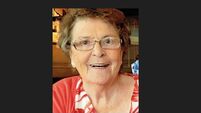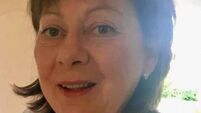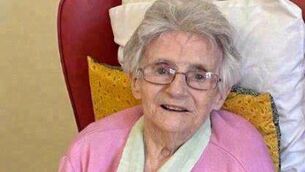Cultural connections: Remembering Waterford centenarian Breda Power of Killowen and Mahon Bridge
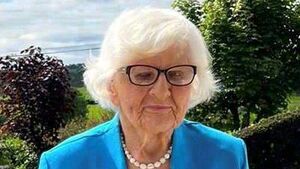
The late Breda Power on the occasion of her 100th birthday earlier this year.
Breda Power 15th June 1925 – 8th August 2025
. There is a wise one gone from the Déise plain. That’s how Breda’s Furleigh neighbour and renowned file Bob Weldon, who died 11 years before her birth, began his lament for Patrick Carmody, the local Church of Ireland schoolmaster who wrote down his oral poetry, ensuring its survival. Breda, like her father before her, was a fount of local knowledge and lore. While she knew her history and cherished those long gone, Breda lived in the present devouring both national and local papers. She’d be honoured, as we are, to know that something of what she held dear and how she lived will be shared with the readers of the local newspaper.
Many tourists visiting Mahon Bridge today mightn’t know that Crough Coffee was preceded for a long time by the thriving Power Shop where Breda grew up, surrounded by a creamery, mill, blacksmith’s forge and home of artic explorer John Palliser.
Situated at the intersection of routes linking Dungarvan to Carrick, Kilrossanty to Fews, Kilmac and further afield, where the flat fertile plain meets the rugged Comeragh Mountains and, as in the rest of the country, two cultures collided: indigenous Gaelic and invader Anglo. Breda was interested in this interaction, and the struggle to keep our culture and language alive.
Pádraig Tyers told me that in the late 1950s he interviewed in Irish for Radio Éireann Bridget Weldon, daughter of the poet, who married Mahon Bridge neighbour Jack Harris and by then had a forge in Cregg, beyond Carrick. Sadly, the tapes were reused and the precious conversation lost. Incidentally when, in order to confirm Brigid Weldon’s name, I got in touch with her granddaughter Bernie Cox, she was in a Ring College class learning Irish. That the highly regarded Gaelic poet Bob Weldon’s great granddaughter would need to artificially reacquire the native tongue in which he lived, breathed and so captivatingly composed, indicates the extent of the cultural collapse.
Breda was immensely proud of our Henebry relatives who did so much to preserve our language and culture, principally Portlaw’s An tAth Risteard, UCC professor of Irish, co-founder of Coláiste na Rinne and one of the first to record and analyse traditional Irish music, who died of TB on St. Patrick’s Day 1916. His nephew, the Jesuit Piaras de Hindeberg, travelling by Vespa or small motorbike, devoted his spare time to visiting Waterford native speakers and recording their lore, on which a dictionary of Waterford Irish, Díolaim Dhéiseach, is based. He was known to bring a pig’s head or bottle of whiskey as gifts, once seen mid Mass spilling the contents of the chalice outside the door having mistakenly used uisce beatha instead of altar wine!
Thankfully he realised his error before praying over it!
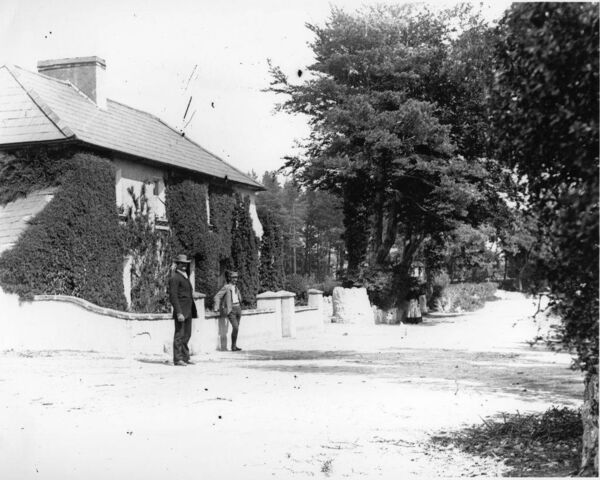
Indicative of the difficulty of holding on to our language once colonisation had turned the cultural tide, Piaras was taunted as a child by shawl wearing customers in his Portlaw Irish speaking family’s huckster shop, "you can’t talk English!" to which he replied, "I can. Cabbage!" I had the privilege of anointing Piaras’ last surviving sibling Bríd (whose land in Oldcourt, near Kilmeaden, Breda’s son Seamus now rents) and to hear her speak perfect Déise Irish.
Vestiges of our traditional Irish societal structure based on tribes and kingships live on in our sporting loyalty to the Déise, and our focus on the clan: knowing our extended family and web of relations spreading out over a large area. Breda inherited this instinct and took a huge interest in everyone, living or dead. Her father Pat Power was so attentive to local lore that UCC students were sent to him. My mother used to say that he was always talking and telling stories, which is the essence of our cultural tradition: passing on, by word of mouth, handed down accounts of events and tales.
He told my father about maidhm sibéal: before a flood would come, you’d hear a terrifying roaring from the mountain; the turf banks, fully saturated, would burst releasing a torrent of pent-up water carrying rocks and stones down the Mahon. Some even called him Mahon.
Auntie Bridie, Breda’s mother, one of 15 Hallys from where the Baylough windmills now stand, and who taught in Tybroughney until she got married, was fondly remembered for her warm welcome and the lemonade she’d fetch from the shop for visitors’ children. Breda’s aunt, Alice White up the hill in Crough, would instead give eggs, soon to be "cashed in" for sweets with Uncle Pat!
Younger adults may consider homedelivery by the likes of Tesco a new invention, but Breda and Billy (who became a priest) and later James, first with a horse drawn shop then motorised van, travelled every boreen and road in the region, bearing provisions of all sorts, as well as news of who died or had a baby or whatever. They were like accidental social workers, visiting the lonely, linking the isolated, a welcome face at every door.
Breda worked hard, but she was also a fulcrum of community. Making money was only part of the package. There was a bigger picture: knowing and loving everyone.
When Auntie Jo, my step grandaunt, died in the fifties, Breda cycled to Ballydurn and kept vigil all night, until 6am when she headed home for work. Always open to opportunities, Breda jumped at the offer of a day out in Cork when my ailing grandfather Eddie Cunningham engaged her neighbour John Paul Quinn to drive him to a consultant.
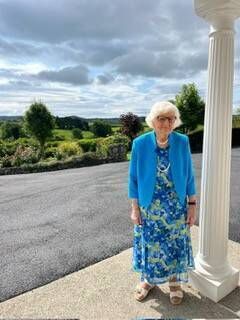
Breda married Jimmy Power in 1960 and moved to Killowen, Dunhill, happily farming and rearing Séamus, Noelle and Patrick. Ever interested and involved, the day before she died she rose at 7am to tell her granddaughter staying over, "Get up and go to work!"
If Breda’s annual Christmas card sign off "from all in Killowen" didn’t adequately express her largesse, then the guest list for her 100th birthday party, with six months advance notice in her own handwriting, left no one in any doubt but that she had a huge heart, and that family and friendship meant so much to her.
Let’s be honest: most of the people she was closest to for the greater part of her century-long life are no longer here; and she still had a great gathering with those of us who are left.
Dunhill, where she spent almost two thirds of her days and whose ins and outs she knew well enough to stand up at a public lecture and courteously contradict the professional historian, was very well represented by friends and neighbours at the party symbolising how well she integrated into her adopted community. Resplendent in her blue outfit, she sat and chatted to each one, reminiscing on happy times gone by and inquiring after everyone, laughing through it all.
Tá saoi ar lár ar mhá na nDéise. There is a wise one gone from the Déise plain. "Keep the 15th of June 2025 free and PG I will be 100 years old – if God spares me!!! Tell the Hassett family to keep the day free." That was the Christmas card invite many of us received, but with the wise proviso ‘Please God’ and ‘if God spares me’. Full of faith, she wasn’t getting carried away. Today, we trust she’s at the perennial party, regaling and reuniting with those who couldn’t make it to Faithlegg Hotel on the fifteenth. Now we celebrate her celestial birthday. Breda, fadsaol, breithlá shona is slán go fóill.

